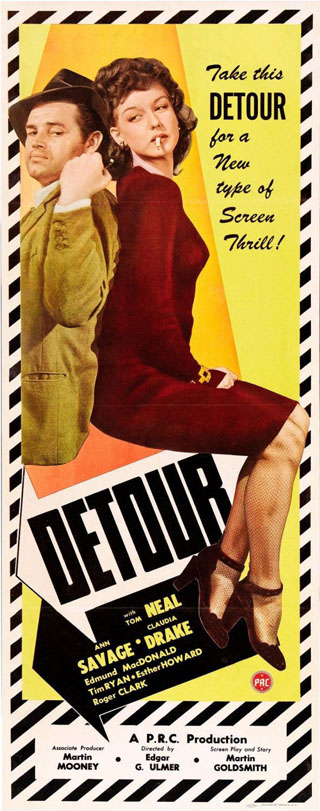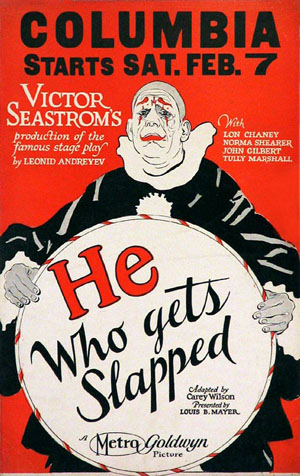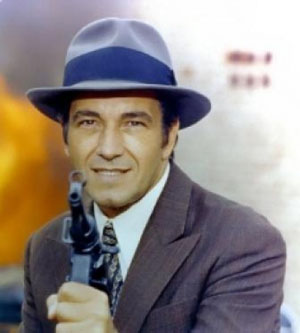A second round of essays has been added to LOLA 3 (the first went up a bit over a week ago). Dana Linssen asks, “is there a female way of looking at film, and does this lead to a fundamentally different conclusion about film, distinct from those made on the basis of personal interests and sensibilities?”
Also: Luc Moullet on the “perplexing” career of Edgar G. Ulmer, who “is, like a lot of major filmmakers, a man of the 19th century, linked to its ideology, to its traditional dramatic structures—which explains a certain indifference toward him from modern critics”; Tom O’Regan on the evolution of television’s aesthetic norms; Cristina Álvarez López on João Pedro Rodrigues and João Rui Guerra da Mata’s The Last Time I Saw Macao; and LOLA co-editor Girish Shambu‘s big report on last fall’s Toronto International Film Festival, in which he asks, “Is Žižek a good critic of cinema?”
LOLA‘s other co-editor, Adrian Martin, has a new column in De Filmkrant: “Those who follow trends in philosophy are likely to be aware that much noise was been made lately about a new branch on the tree called, variously, Speculative Realism, New Materialism, or (more fancifully) OOO, for Object Oriented Ontology…. OOO contests the deeply held notion that ‘man is the measure of all things’—that everything in the world exists to be processed by and evaluated through human consciousness…. As a cinephile, I greet OOO with a certain familiarity.”
As noted in October, Adrian’s newest book is Last Day Every Day: Figural Thinking from Auerbach and Kracauer to Agamben and Brenez, and Zach Campbell is now putting together “a bibliography-in-progress for anyone interested in pursuing the line of inquiry concerning figural criticism of cinema.”
Catherine Grant points us to a new issue of CINEMA: Journal of Philosophy and the Moving Image and especially recommends Vivian Sobchack‘s essay, “Fleshing out the image: Phenomenology, Pedagogy, and Derek Jarman‘s Blue.”
Stoffel Debuysere translates a piece Jacques Rancière wrote on the work of Danièle Huillet and Jean-Marie Straub for Le Monde diplomatique in 2004.
Terrific roundup at DC’s: “For Your Crushed Right Eye: The instrumental films of Takahiro Iimura, Tetsuji Takechi, Toshi Matsumoto, Masao Adachi and Takashi Ito.”
James Udden, author of No Man an Island: The Cinema of Hou Hsiao-hsien, has recently visited the set of Hou’s wuxia film (yes, that’s right), The Assassin, slated for release in 2014.
The Association Française des directeurs de la photographie Cinématographique presents an in-depth interview (in English) with cinematographer Caroline Champetier, who discusses her work on Leos Carax’s Holy Motors.
“The ‘cultural exception’—a term that’s just twenty years old—is the way that France defines its protection of its movie business against the demands of free-trade agreements and their inevitable opening of floodgates to Hollywood movies.” And a debate about its future rages. Richard Brody outlines the arguments.
Gwendolyn Audrey Foster in Film International: “Fifties Hysteria Returns: Doomsday Prepping in a Culture of Fear, Death, and Automatic Weapons.”
Peter Bogdanovich posts a third round of notes taken between 1952 and 1970 on films by Alfred Hitchcock. And Keith Uhlich opens a file on Fritz Lang at the Completist.
Jim Knipfel in the Chiseler: “To call 1924’s He Who Gets Slapped perhaps the creepiest and most disturbing film of Lon Chaney’s career is saying quite a bit, especially as it was made smack in the middle of his 10-film collaboration with Tod Browning—a collaboration that gave us films like West of Zanzibar and The Unknown—but there’s something about the vengeful clown picture that wriggles under the skin and settles in the subconscious. For those of us who came to the film with a deep and profound fear of clowns already in place, it’s like a nightmare realized.”
In other news. Wesley Morris, who won this year’s Pulitzer Prize for criticism, is leaving the Boston Globe to write for Grantland full-time, reports Criticwire‘s Matt Singer.
Music that Bo Harwood wrote and recorded with John Cassavetes is about to be made available: 20 tracks and a 60+ page booklet. Peter Rinaldi has details.
“Wong Kar-wai‘s long-awaited martial arts film The Grandmaster was shown in public for the first time in Beijing on Sunday, after more than six years in production,” reports the AFP. “The film spans several decades of Chinese history to tell the story of legendary martial artist Yip Man, who went on to train Bruce Lee, and features lengthy battles between rival kung fu masters.” And it’ll open the Berlinale in February.
Books. Reviewing Baradwaj Rangan’s Conversations with Mani Ratnam, Srikanth Srinivasan notes the “central dialectic… between a professional who relies on bringing to surface structures and mechanics of films and another whose job is to conceal them.”
In Slate, John Lingan argues that Jason Sperb’s Disney’s Most Notorious Film: Race, Convergence and the Hidden Histories of Song of the South “is an intelligent and readable academic treatment of [the film’s] long shadow.”
Lawrence Christon reviews David Thomson‘s The Big Screen for the Los Angeles Review of Books.
Which brings us to Los Angeles. “The UCLA Film & Television Archive’s Clara Bow retrospective, which includes 11 films and a program of clips, is titled Call Her Savage after Bow’s 1932 film, ‘savage’ being an endearment that is frequently applied to the actress on screen to indicate her wild-eyed spontaneity,” writes Nick Pinkerton in the Weekly. “Bow is defined by a Roman-candle emotionality that sparkles in a dazzling variety of hues in close-up—sullen one second, frantic the next, smoldering after that, and nothing for very long—as well as her fluttering activity, which she sometimes elevated into bouncing-off-the-walls hophead frenzy.” Through February 10.
And, happening throughout January at Cinefamily:
DVD/Blu-ray. Kino’s “spectacular” 14-disc Buster Keaton Collection “demands attention as an infinitely rewarding anthology of the major works of a major artist,” writes Dave Kehr in the New York Times. Also recommended is Warner Home Video’s “Blu-ray upgrade of the superb three-disc edition of The Jazz Singer from 2007.”
“Based on his superb, and highly accessible, book-length history of the medium, writer/scholar Mark Cousins‘s epic, 15-plus hour The Story of Film proves an unduly compelling documentary,” writes John Semley.
Also in Slant, Budd Wilkins: “The specter of Cosmopolis, David Cronenberg‘s latest fuck-all wonder, now haunts home video in [a] pristine Blu-ray transfer, laden with all the contextual cultural capital you could ever hope for.” On a related note, the Playlist‘s Drew Taylor recently spoke with Cronenberg and learned that the director’s novel may be out later this year and that he’s scheduled tackle Map to the Stars, with Robert Pattinson and Viggo Mortensen, and Rachel Weisz, in May.
One more project in the works. “John Malkovich is set to be reunited with Austrian film and opera director Michael Sturminger for a big screen adaptation of The Giacomo Variations,” reports Screen‘s Martin Blaney. Malkovich “will reprise his role as an aging Casanova, reliving past exploits in a surreal series of operatic flashbacks.” Graham Fuller has more at Artinfo.
Obits. “Sergiu Nicolaescu, a prolific Romanian director known for his historical epics who also served as a Senator, has died,” reports the AP. “He was 82.” Ehsan Khoshbakht pays tribute to “one of my first movie stars and heroes who enjoyed massive popularity in Iran…. Growing up watching East German westerns, Bulgarian war films, and the Soviet Union spy TV series, Nicolaescu was closest thing to that cinema of style and excitement I had only heard about from my father and others in regard to the haven of filmgoers—the pre-revolution Iran.”
Grady Hendrix tells the Hollywood Reporter‘s Jane Kellogg about the final days of another founder of the New York Asian Film Festival, Daniel Craft, who’s passed away at 41. Craft had wanted to see Star Trek: Into Darkness, which of course, won’t open until May. But the community at r/StarTrek and J.J. Abrams made it happen.
“Tony Lip, known for his mob roles on television’s The Sopranos, and in films Donnie Brasco, Goodfellas and The Godfather, died Friday,” reports Evonne Coutros at NorthJersey.com.
Viewing. The trailer for Michael Polish’s Big Sur is up at the Playlist. The adaptation of Jack Kerouac’s novel will premiere at Sundance. Also: Terry Gilliam’s The Wholly Family (19’43”).
Ray Pride has Gaspar Noé’s video for “We No Who U R,” from the upcoming Nick Cave and the Bad Seeds album Push the Sky Away.
From Filmmaker editor Scott Macaulay: “Josh and Benny Safdie (Daddy Longlegs) take on the illegal wildlife trade in The Trophy Hunter, a PSA made for the Turtle Conservancy and supporting Traffic.org.”
More browsing? See the new roundups from the Film Doctor, Steve Greene, Girish Shambu, Chuck Tryon, and John Wyver.
Lists and Awards 2012: Index. For news and tips throughout the day every day, follow @KeyframeDaily on Twitter and/or the RSS feed. Get Keyframe Daily in your inbox by signing in at fandor.com/daily.






